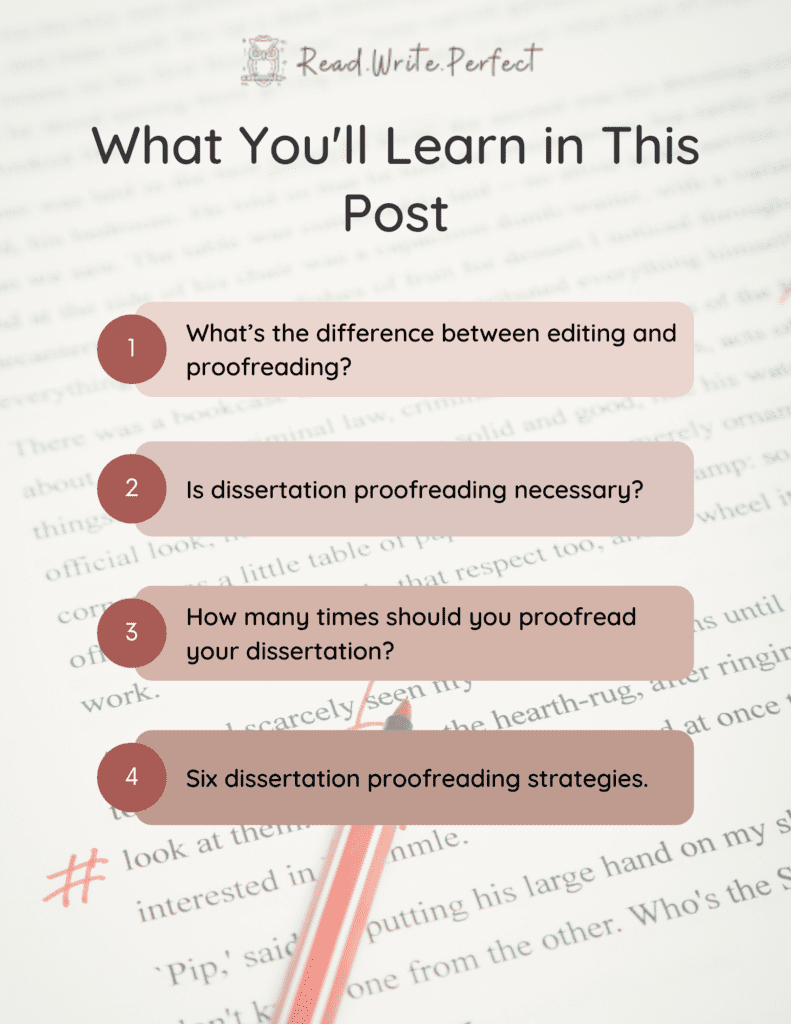
Daunted or not, however, proofreading is an essential part of the dissertation writing process. Here are some top tips taken straight from the professional proofreading industry that you can use to up your proofreading game.

Editing covers the big stuff – issues with your research design, content, use of sources, and so on. Proofreading is for the smaller stuff – grammar, expression, formatting errors, missing citation, and so on. Editing should be done in part by your supervisor, although it doesn’t hurt to ask others to help as well. Proofreading is not something most supervisors do, and you will need to do this yourself or ask someone else to do it for you.

Mistakes in formatting, expression, and grammar are distracting to readers and will detract from the clarity of your argument and research, impacting your overall grade. Citation errors can be even more serious, leading to accidental plagiarism or academic integrity issues.
While everyone should proofread their dissertation, you may want to consider extra proofreading support if you are a weak writer, an ESL student, or simply feeling daunted or uncertain.

This rule is not hard and fast, though. It’s worth doing a separate proofread for each major issue you think you will encounter. So, if you know you are a weak speller, for example, it might be worth doing a proofreading pass just to check spelling. Focusing on only one issue at a time may be more time consuming, but it will yield more accurate results.

It may sound wacky, but reading your dissertation backwards, one sentence at a time, will help stop you focusing on macro-level content and allow you to spot small errors more easily. When we read at a high level, our brains tend to skim details in order to take in the big picture and complex ideas. Reading backwards prevents this, allowing you to see the small stuff.
When you are working with a several-thousand-word document, there are bound to be inconsistencies. These can get difficult to keep track of. As well as following a standard style-guide, like APA, MHRA, or Turabian, also make your own personal style guide. Do you hyphenate certain words that you use frequently, for example? Do you provide measurements to one decimal place or two? Keep a running list of key words, terms, and stylistic decisions that are not covered by your published style guide and consult it as you proofread.
Proofreading a document as long as a dissertation can also be physically and mentally draining, taking a toll on your back, your eyes, and your energy levels. To avoid burnout while you proofread, break your task into manageable tasks – a chapter or even a section of a chapter at a time. In between chunks, take breaks to stretch, eat, sleep, or do something fun and recharge. You will return to the task more alert and efficient.
Even with frequent breaks and really good tools, you are still likely to miss things as the writer of the dissertation. This is because you are too “close” to the document – you know it too well. That’s why it’s always a good idea to have a second set of eyes proofreading for you, whether that’s a sympathetic friend, a fellow student, or a professional proofreader. If you ask a friend or colleague, find a way to say thank you – proofreading is no more fun for them than it is for you.
Finally, it’s helpful to wait a little while after writing your dissertation before attempting to proofread. Again, you are likely to be very “close” to your work, so a break of a few days or even weeks can help you approach it with fresh eyes and a new perspective.
Citations and references are notoriously difficult to proofread. To make sure that the citations or footnotes in your main document match the references in your reference list or bibliography, use the “split-screen” function to view the reference list alongside the main document. As you read, check that publication dates match, authors’ names are spelled correctly, and no references are missing. Highlight each source in the reference list that you check in the main paper – this will enable you to see if any references are for sources you haven’t actually used.
The key thing to good proofreading is to be patient and thorough. If you are not sure about something, don’t guess – look it up. Remember: your writing and presentation are your most direct link to your audience. Make sure they reflect the best of you!
Need more help getting your dissertation submission ready? A dissertation coach can teach you valuable proofreading skills – and do some of the proofreading and editing for you! Book a free session to find out more.
